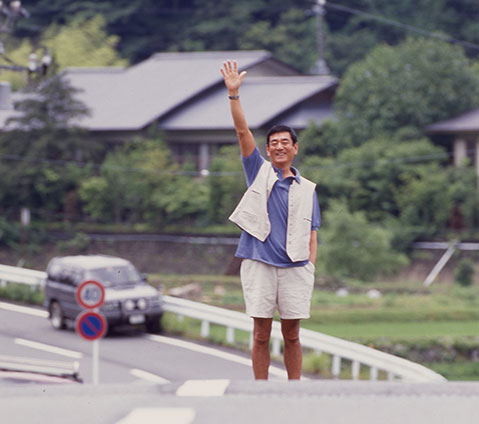Ken San
Director Yuichi Hibi

In the documentary Ken San, director Yuichi Hibi takes a look at one of Japan’s most legendary actors, Ken Takakura. More than an examination of his life, the film is a meditation on the creative process, and how an artistic giant like Takakura meets life in all its joys and sorrows.
What drew you to document the life and legacy of Ken Takakura?
It wasn’t my idea to make the film. It would be too big of an undertaking for any Asian filmmaker to make a film about Ken Takakura. It would be similar to an American filmmaker to choose to make a documentary on Clint Eastwood. It would be such an enormous undertaking. With Ken Takakura, it is the same. Ken is that large a figure in Asia. There were a few stages before the production side eventually chose me to direct. It was like an actor going to audition for a major part. They liked my vision of the project I pitched in the end.
What was the most surprising thing you learned about Ken-san in the filming of the documentary?
I think the most surprising part was “how much” Ken inspired the interview subjects, and what they revealed about Ken. They went into his figure much more deeply than I ever expected. I mean, I knew these people had a connection with Ken, but I had no idea how deep it was. I was honored to record those moments and their words.
Where do you see Ken-san’s influence continuing in Japanese cinema or cinema of the world?
Ken wasn’t just any other actor. He really had his own style. He also was proud to be Japanese, so he was trying to show the positive spirit and culture of Japan through his work. Unfortunately, there are not many actors like him anymore. But I feel the same overall, with the rest of the world, that there are not many old-fashion actors with class left in world cinema. There are fewer and fewer as the years go on. “Drugs and sex” are fine, but I would like to see and learn from the cinema — learn something about the human condition. Ken taught us “morality” through his films.
Ken seemed attuned to the loneliness of artistry and genius. Do you think a kind of loneliness is a cost of artistic greatness?
I was an actor for a while when I was younger. I’ve lived as a photographer for the last 20 years. Being as an artist is often lonely. Often you need to be alone in your thoughts and work in order to create something you are satisfied with. Being famous and lonely is a bit different from the creative process, so when you become a famous and lonely, many will probably perceive you as a tortured figure. But on a more serious note, as we learn in the film, making sacrifices is often part of the focus of making great art.
What is your favorite example of Ken-San’s acting/artistry and why? How has he informed/shaped your own aesthetic?
That is difficult to answer. He appeared in 205 films. However, Ken’s work affected me when I write dialogue (or direct). He taught me that less is more when you are creating scenes. I think in general, modern actors express too much (“screaming and sobbing”) in order to deliver a good performance. It depends on the material, of course, but I think Ken created his own kind of style, which I think is rare. It stands on its own.
What are some of the lessons or wisdom we can learn from the life of Ken Takakura?
To be humble. And to live today as if it were your last.



